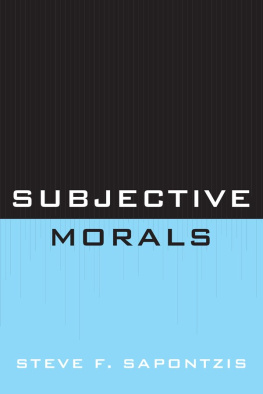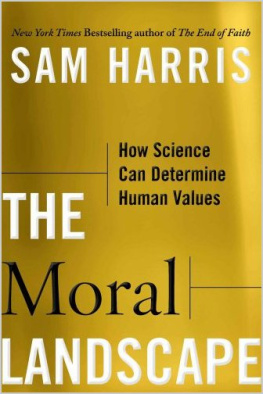Subjective Morals
Steve F. Sapontzis
University Press of America, Inc.
Lanham Boulder New York Toronto Plymouth, UK
Copyright 2012 by
University Press of America, Inc.
4501 Forbes Boulevard
Suite 200
Lanham, Maryland 20706
UPA Acquisitions Department (301) 459-3366
Estover Road
Plymouth PL6 7PY
United Kingdom
All rights reserved
Printed in the United States of America
British Library Cataloging in Publication Information Available
Library of Congress Control Number: 2011935819
ISBN: 978-0-7618-5685-6 (paperback : alk. paper)
eISBN: 978-0-7618-5686-3
 The paper used in this publication meets the minimum requirements of American National Standard for Information SciencesPermanence of Paper for Printed Library Materials, ANSI Z39.48-1992
The paper used in this publication meets the minimum requirements of American National Standard for Information SciencesPermanence of Paper for Printed Library Materials, ANSI Z39.48-1992
Introduction
One of the crimes with which Socrates was charged was corrupting the youth of Athens. As portrayed in Platos Apology , Socrates defends himself against this charge by relating how he had respected the traditional values of his society throughout his life, even to the point of risking his life to defend them against threats from abroad and within. He may have spent his life questioning experts, authorities, and wise men about their understanding of moral values (among other things), but he was not a revolutionary in the sense of someone trying to change accepted values. Even though Socrates was convicted of the corruption charge, in his Republic , Plato has Socrates undertake the task of defending traditional Athenian virtues by rationally demonstrating that we should be just, wise, courageous, and temperate even when we need not fear punishment for not being so.
Faith seeking understanding was St. Augustines famous motto for the practice of philosophy following the Christian revelation. According to Medieval and subsequent Christian moral philosophers, it is not the job of philosophy to discover moral valuestrue religion teaches true moralsit is the job of philosophy to clarify, interpret, and defend that teaching. Writing at the beginning of the modern era, Thomas Hobbes (among others) demoted religion to being the mythology we believe insuperstition being the label for mythologies we do not believe. He argued that all human endeavors are self-interested and that the best individuals and societies can do is enlighten their self-interest by taking into account the long-term and widespread consequences of their actions and policies. He recommended this process to his readers by showing how such enlightened self-interest leads to the conclusion that we should behave in conventionally moral ways, i.e., be charitable, grateful, and otherwise act as would an English gentleman.
A little over two hundred years ago, Immanuel Kant advocated a Copernican revolution in philosophy through basing certitudes of science and math on the structure of our understanding rather than on contacting the reality behind the appearances. It may be that this subjective turn was motivated in part by Kants desire to rescue morals from the perils of scientific determinism since it allowed him to postulate that human actions are both determined as phenomena yet entirely free when motivated by pure practical reason and are, therefore, properly commanded, rewarded, and punished. Kant made the world safe for morals and like Hobbes recommended his moral philosophy to his readers by showing how it provided a rational foundation for common moral valuesthis time keeping our promises, developing our talents, not committing suicide, and other commandments of Prussian Protestantism. About forty years ago John Rawls showed that logical, well-informed people operating in a situation that precluded self-centered choices would opt for a society governed by principles wei.e., contemporary, liberal, American intellectualscan all recognize to be fair. Again and still, the job of mainstream moral philosophy is understood to be searching for a reasoned basis for mainstream moral valuesi.e., to provide a defense of or apology for those values.
This book is not in that tradition, nor is its purpose to oppose it by arguing for moral values out of the mainstream. It is a work of moral philosophy in that it is concerned with careful analysis of concepts, ideas, and categories that structure our moral practicemainstream or otherwiseand of what does or does not logically follow from them. Whether or not, to what extent, and in what ways these analyses reflect positively or negatively on morals are not goals to be achieved here but conclusions that will be arrived at. However, in this era where transparency has become a high priority value, I want to acknowledge that undertaking this study has been motivated by the contrast between the high regard for morality that permeates moral philosophy and the rampant misery that moral practice has caused and continues to cause today. How is it that values which are supposed to maximize general welfare, respect individuals, express a pinnacle of human achievement, help us fulfill divine purpose, and embody the social contract on which we all depend also justify genocide, torture, and war, crushing love and the joy of intimacy, scourging us with shame and guilt, condemning half the human population to servitude, and turning a blind eye to the massive suffering we inflict on nonhuman animals? And is there anything we can do to enhance those virtues of morality and reduce its vices? The hope that analyzing the nature of moral value can help answer those questions has made the time spent on writing this volume feel worthwhile.
What will fundamentally and pervasively guide these analyses is that morals are values and values are subjective. Much writing about moral values either attempts to make them out to be some sort of fact or else dismisses them because they cannot be objective. In what follows, we shall discuss the subjectivity of values by, first, providing a variety of arguments supporting the claim that values require feelings for their existence (Chapter One). This discussion will continue by showing how a subjective theory can enhance our understanding of values (Chapter Two) and how, contrary to the protestations of mainstream moral philosophers, being subjective does not render values persona non grata in the land of reasoning (Chapter Three). In Chapter Four, we shall carefully focus in on what sort of values morals are and in Chapter Five on what the much maligned idea of moral relativism can involve. In Chapter Six, we shall discuss how moral values function, for better and for worse, in human psychology and society. Finally, in Chapter Seven, we shall consider the implications of these analyses, discussions, arguments, and interpretations for some traditional moral theories, practices, and problems; i.e., the last chapter will provide general principles for the sort of substantive moral philosophy that can follow from a subjective theory of value.
Chapter One
Starting with the Eye of the Beholder
1. No value without feeling
Things have value through their relation to feelings. For example, colorful sunsets have positive value because some sentient beings enjoy them. So much is uncontroversial. What is controversial, particularly where moral values are concerned, is whether such relation is a necessary condition for things having value. I believe that is the case and in this chapter will present three parts of an argument for that belief. Those parts are an extensive, Humean thought experiment I call the primary argument, three confirming arguments, and responses to six objections to subjective morals which have been widely repeated in the anti-moral relativism literature of the past (roughly) seventy-five years. The final section of this chapter will be devoted to presenting and discussing Platos classic, dramatic dismissal of subjective morals in his dialogue Euthyphro . Plato presents two intuitively powerful objections to subjective morals. Chapters two through six of this volume can be viewed as outlining the fundamental, extensive rethinking of values that is required both to answer those objections and to avoid the pitfalls morality encounters by accepting Platos intuitions.










 The paper used in this publication meets the minimum requirements of American National Standard for Information SciencesPermanence of Paper for Printed Library Materials, ANSI Z39.48-1992
The paper used in this publication meets the minimum requirements of American National Standard for Information SciencesPermanence of Paper for Printed Library Materials, ANSI Z39.48-1992